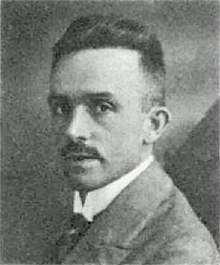Fritz Hesse (politician, 1881)
Fritz Hesse (born February 13, 1881 in Dessau , † April 30, 1973 in Bad Neuenahr ) was a liberal German politician ( DDP , LDPD ), lawyer and Lord Mayor of Dessau.
Life and work
After graduating from high school in Dessau, Fritz Hesse, who was a Protestant , studied law in Jena , Berlin and Halle / Saale . He established himself as a lawyer in Dessau in 1907. In the same year he married Lucie Boelcke, the sister of the fighter pilot Oswald Boelcke . From this marriage two children (Gerhard and Wolfgang ) were born.
Hesse had been the mayor of Dessau since 1918. (see under public offices ). After his impeachment in March 1933, Fritz Hesse left Dessau and reopened a law firm in Berlin, later he ran his brother-in-law's business in the Mark Brandenburg region and moved to Wandlitz near Berlin. For a few weeks after the end of the Second World War he was appointed mayor of Wandlitz before he returned to Dessau and was again mayor there. At the same time he was 2nd Vice President of the Dessau District Administration of the Province of Saxony . From 1946 he worked again as a lawyer in Dessau. This activity made him unpopular with those in power at the time and had to flee to West Berlin in 1950 . Here too he worked as a lawyer. He later moved to Munich .
Fritz Hesse received the Federal Cross of Merit 1st Class in 1956 .
The city of Dessau honored Hesse after the fall of the Wall by naming a street and donating the Fritz Hesse Medal as an award for deserving citizens.
Political party
In the Weimar Republic , Hesse belonged to the DDP . After 1945 he participated in the founding of the LDPD .
MP
When he was elected in 1910, Fritz Hesse became a city councilor in his hometown of Dessau.
As a member of the Weimar National Assembly in 1919/20 , Fritz Hesse was a father of the Weimar constitution . From 1918 to 1928 he was a member of the state parliament of the Free State of Anhalt . In the state elections in 1946 he was elected to the state parliament of Saxony-Anhalt , he exercised his state parliament mandate until 1950.
Public offices
In 1918, Hesse was elected mayor of Dessau and took office on February 16, 1918. During his tenure he promoted residential construction in particular by developing inexpensive building land. In 1925 he managed to bring the Bauhaus, threatened with closure, from Weimar to Dessau. During his tenure, Fritz Hesse also worked for a number of years on the board of the German Association of Cities . He also served from November 14, 1918 to July 22, 1919 as a State Councilor in the government of the State of Anhalt led by Prime Minister Wolfgang Heine .
As early as 1932, the National Socialists were able to take over the Anhalt government. This increased the pressure on the Bauhaus and also on Fritz Hesse. After the NSDAP came to power , he was driven out of office on March 6, 1933, temporarily replaced by Emil Evers and a little later by Hanns Sander .
On July 2, 1945, the Soviet occupying power reinstated Hesse as Lord Mayor of Dessau, but he was not re-elected in 1946. Karl Adolphs ( SED ) took over his office . Hesse then moved to the western part of Germany .
Publications
- Memories of Dessau. Vol. 1: From the residential to the Bauhaus city. Vol. 2: From the years 1925 to 1950. Self-published, Munich 1965
See also
literature
- Martin Schumacher (Hrsg.): MdR The Reichstag members of the Weimar Republic in the time of National Socialism. Political persecution, emigration and expatriation, 1933–1945. A biographical documentation . 3rd, considerably expanded and revised edition. Droste, Düsseldorf 1994, ISBN 3-7700-5183-1 .
- Wolf Hesse: "Fritz Hesse and his path to becoming a local politician", in: Dessauer Calendar 2020, pp. 24 - 35, ISSN 0420-1264
Web links
- Literature by and about Fritz Hesse in the catalog of the German National Library
- Fritz Hesse in the database of members of the Reichstag
Individual evidence
| personal data | |
|---|---|
| SURNAME | Hesse, Fritz |
| BRIEF DESCRIPTION | German politician |
| DATE OF BIRTH | February 13, 1881 |
| PLACE OF BIRTH | Dessau |
| DATE OF DEATH | April 30, 1973 |
| Place of death | Bad Neuenahr |
